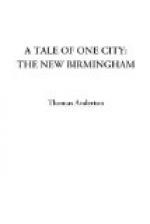The Birmingham Morning News was carried on for some four years at a very considerable loss, and just when it seemed to be about to turn the corner and get into a more profitable groove, its capitalist proprietor gave it up in disappointment and disgust. For one thing, he found it difficult to get all the influential help he wanted in the news department, and he was probably getting a little weary of putting money into a basket that seemed to have no bottom to it. Yet it was believed by those well experienced in newspaper management that another year would have seen a favourable turn in the fortunes of the paper. The costly ground baiting which is necessary in a newspaper establishment had been done, and the expensive seed which has to be sown was about to come up when the proprietor resolved to plough the paper up and so add another to the formidable list of local newspaper failures.
In the grave of the Birmingham Morning News were buried many hopes. The proprietor hoped to make a fortune. Mr. Dawson hoped to make an income and secure a still wider influence through its medium. Its rivals hoped it would not succeed, and by its death and burial their hopes were realised.
One little incident in connection with local journalism I must record here as being something almost unique. I refer to the astounding sketch Mr. H.J. Jennings—for many years editor of the Birmingham Daily Mail—wrote of himself in 1889, and the circumstances that led to its publication. After many years’ connection with the Daily. Mail, Mr. Jennings went over to another local evening paper, the Daily Times, and by way of giving it a fillip he published in its columns a series of papers on “Our Public Men.”
That these sketches were not entirely flattering to the subjects of them will be readily understood. Mr. Jennings always was a smart, spicy, and sometimes even brilliant writer, but he could not help being more or less cynical. He rather liked to stick the toasting fork into his subjects, and then hold them pretty close to the bars of a decidedly hot fire. The result was that many of them burned and smarted under the ordeal. One of the victims went so far as to propose that this self-appointed censor of public characters should be fought with his own weapons, and have a taste of his own nasty physic. In a word it was suggested that someone should draw Mr. H.J. Jennings’ portrait on his own lines after his own manner.
Mr. Jennings promptly took up the gauntlet that was thrown down and immediately proceeded to write a sketch of himself, which appeared in the Birmingham Daily Times of May 29th, 1889, and was, perhaps, one of the most daring and audacious feats of contemporary journalism on record. If he had entrusted his task to his most bitter enemy it could hardly have been more scathing than it was.
Mr. Jennings certainly did not blunt his steel when he proceeded to operate upon himself. He did not spare himself, but dug the knife in and turned it round. It was, indeed, a singularly curious piece of biography, written with all the pungency and point its writer could command, and it need hardly be said that such a sketch silenced the guns of some of his foes and made something of a sensation in the town.




